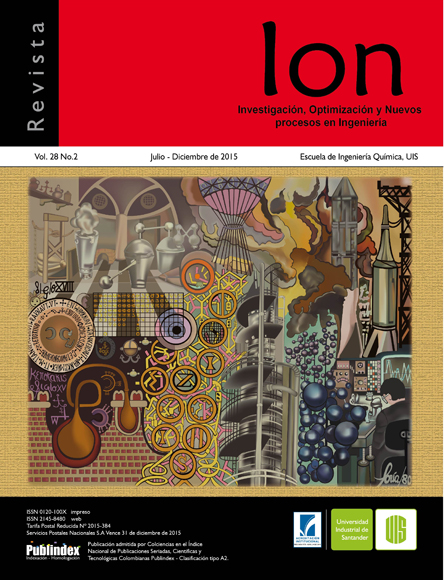Adsorption of Ni(II) ions on pellets of benthonitic clay
Published 2015-12-30
Keywords
- Nickel,
- Adsorption,
- Bentonite,
- Clays,
- Kinetic.
How to Cite
Abstract
The presence of metal ions in wastewater generates a toxic effect on marine ecosystems and public health. Clays are naturally occurring materials with high adsorption capacity, low cost, practical for implementation in industrial scale for the removal of metal ions. Its implementation is limited to the development of alternatives to the use of these clays on a large scale and continuous processes. Pelletizing clays can be used in fixed bed columns. In this work the kinetics of adsorption of nickel ions on a benthonitic pelletized clay was evaluated. The extrudes were prepared by wetting the clay with a solution acidified with nitric acid at 2 %v. The proportion of clay / aqueous solution volume was 2:1. The adsorption kinetics of Ni(II) a pseudo second-order model is adjusted. The kinetic constants of the fitted model were 2.792x10-3, 8.085x10-4 and 6.292x10-4 g/mg.min and reaction temperatures for 25, 45 and 60 °C, respectively. From the lineation of Arrhenius activation energy and frequency factor for the reaction of adsorption of nickel ions onto bentonite clay was determined to be 29.58 kJ/moland 507.15 g/mg.min, respectively. The magnitude of the activation energy indicates that the controlling step in the adsorption is the chemisorption of the nickel ions on the clay surface.
Downloads
References
[2] Priya PG, Basha CA, Ramamurthi V, Begum SN. Recovery of Nickel (II) Ions from Electroplating Rinse Water Using Hectorite Clay. Modern Applied Science. 2009;3(9):37-51.
[3] Elshazly AH, Konsowa AH. Removal of nickel ions from wastewater using a cation-exchange resin in a batch - stirred tank reactor. Desalination, 2003;158:189-93.
[4] Djomgoue P, Siewe M, Djoufac E, Kenfack P, Njopwouo D. Surface modification of Cameroonian magnetite rich clay with Eriochrome Black T. Application for adsorption of nickel in aqueous solution. Appl. Surf. Sci. 2012;258:7470-9.
[5] Kadirvelu K, Thamaraiselvi K. Namasivayam C. Adsorption of nickel (II) from aqueous solution onto activated carbon prepared from coirpith. Sep. Purif. Technol. 2001;24:497-505.
[6] Malamis S, Katsou E. A review on zinc and nickel adsorption on natural and modified zeolite, bentonite and vermiculite: Examination of process parameters, kinetics and isotherms. J. Hazard. Mater. 2013;252-53:428-61.
[7] Olgun A, Atar N. Equilibrium, thermodynamic and kinetic studies for the adsorption of lead (II) and nickel (II) onto clay mixture containing boron impurity. Ind. Eng. Chem. 2012;18:1751-7.
[8] Vengris T, Binkiene R, Sveikauskaite A. B. Nickel, copper and zinc removal from waste water by a modified clay sorbent. Appl. Clay Sci. 2001;18:183-90.
[9] Adebowale KO, Unuabonah EI, Olu-Owolabi BI. Kinetic and thermodynamic aspects of the adsorption of Pb2+ and Cd2+ ions on tripolyphosphate-modified kaolinite clay. Chem. Eng. J. 2008;136:99-107.
[10] Arias F, Sen TK. Removal of zinc metal ion (Zn2+) from its aqueous solution by kaolin clay mineral: A kinetic and equilibrium study. Colloid Surface A. 2009;348:100-8.
[11] Sari A, Tuzen M, Citak D, Soylak M. Equilibrium, kinetic and thermodynamic studies of adsorption of Pb (II) from aqueous solution onto Turkish kaolinite clay. J. Hazard. Mater. 2007;149:283-91.
[12] Li W, Tang Y, Zeng Y, Tong Z, Liang D, Cui W. Adsorption behavior of Cr (VI) ions on tannin-immobilized activated clay. Chem. Eng. J. 2012;193-194:88-95.
[13] Bhattacharyya KG, Gupta SS. Removal of Cu (II) by natural and acid-activated clays: An insight of adsorption isotherm, kinetic and thermodynamics. Desalination. 2011;272:66-75.
[14] Alabarse FG, Conceicao RV, Balzaretti NM. In-situ FTIR analysis of bentonite under high-pressure. Appl. Clay Sci. 2011;51:202-8.
[15] Mahmood T, Saddique MT, Naeem A, Mustafa S, Zeb N, Shah KH, et al. Kinetic and thermodynamic study of Cd (II), Co (II) and Zn (II) adsorption from aqueous solution by NiO. Chem. Eng. J. 2011;171(3):935-40.
[16] Malkoc E. Ni (II) removal from aqueous solutions using cone biomass of Thuja orientalists. J. Hazard. Mater. 2006;B137:899-908.
[17] Weng CH, Sharma YC, CHU SH. Adsorption of Cr(VI) from aqueous solutions by spent activated clay. Journal of Hazardous Materials. 2008;155:65–75.
[18] Lin J, Zhan Y, Zhu Z. Adsorption characteristics of copper (II) ions from aqueous solution onto humic acid-immobilized surfactant-modified zeolite. Colloid Surface A. 2011;384:9-16.
[19] Boparai H.K, Joseph M, O’Carroll D.M. Kinetics and thermodynamics of cadmium ion removal by adsorption onto nano zero valent iron particles. J. Hazard. Mater. 2011;186:458-65.

